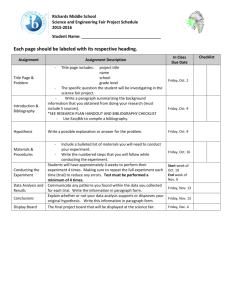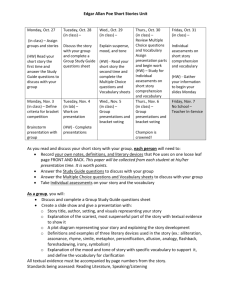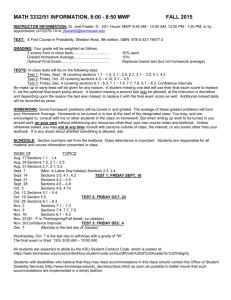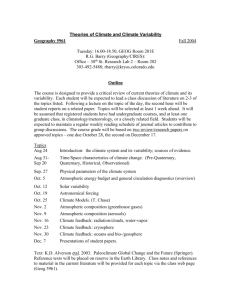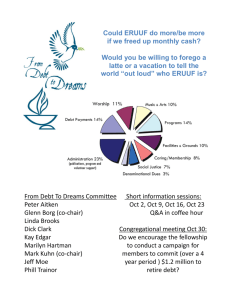Syllabus - Foster School of Business
advertisement
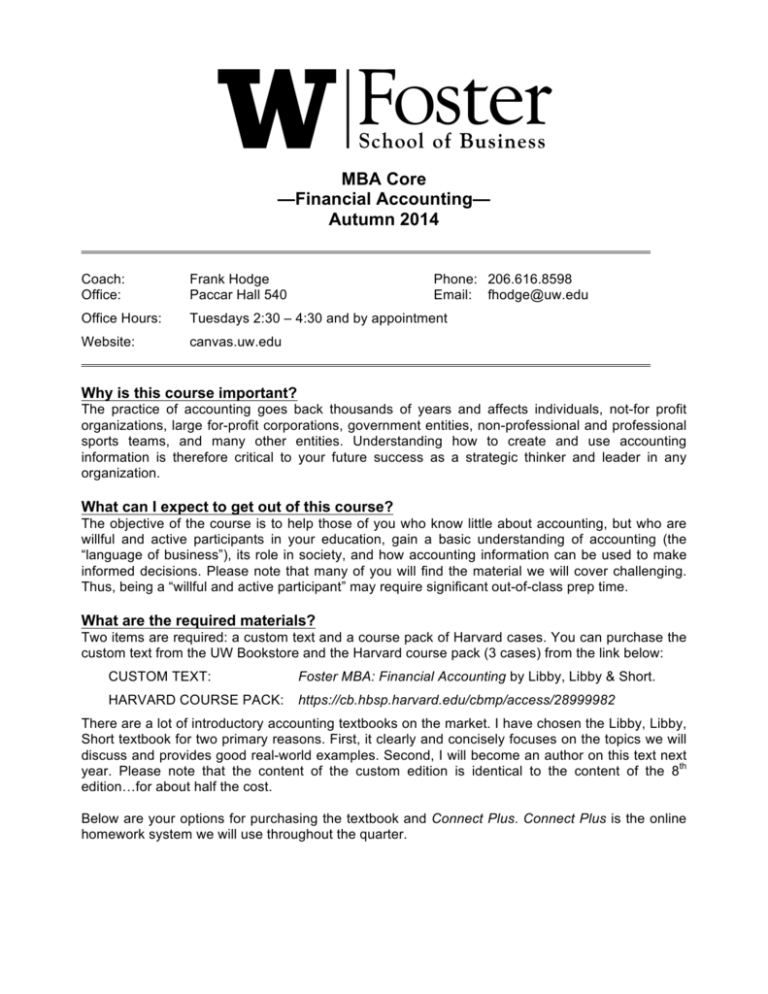
MBA Core —Financial Accounting— Autumn 2014 Coach: Office: Frank Hodge Paccar Hall 540 Phone: 206.616.8598 Email: fhodge@uw.edu Office Hours: Tuesdays 2:30 – 4:30 and by appointment Website: canvas.uw.edu Why is this course important? The practice of accounting goes back thousands of years and affects individuals, not-for profit organizations, large for-profit corporations, government entities, non-professional and professional sports teams, and many other entities. Understanding how to create and use accounting information is therefore critical to your future success as a strategic thinker and leader in any organization. What can I expect to get out of this course? The objective of the course is to help those of you who know little about accounting, but who are willful and active participants in your education, gain a basic understanding of accounting (the “language of business”), its role in society, and how accounting information can be used to make informed decisions. Please note that many of you will find the material we will cover challenging. Thus, being a “willful and active participant” may require significant out-of-class prep time. What are the required materials? Two items are required: a custom text and a course pack of Harvard cases. You can purchase the custom text from the UW Bookstore and the Harvard course pack (3 cases) from the link below: CUSTOM TEXT: Foster MBA: Financial Accounting by Libby, Libby & Short. HARVARD COURSE PACK: https://cb.hbsp.harvard.edu/cbmp/access/28999982 There are a lot of introductory accounting textbooks on the market. I have chosen the Libby, Libby, Short textbook for two primary reasons. First, it clearly and concisely focuses on the topics we will discuss and provides good real-world examples. Second, I will become an author on this text next year. Please note that the content of the custom edition is identical to the content of the 8th edition…for about half the cost. Below are your options for purchasing the textbook and Connect Plus. Connect Plus is the online homework system we will use throughout the quarter. 1. Purchase a NEW hardcover textbook with a Connect Plus access code. o The “standard” hardcover text with Connect Plus will cost you approximately $307 from Amazon. I do not recommend purchasing a hardcover text since lower cost options are available (see below). 2. Purchase a NEW custom softcover textbook. o This is the version of the text sold at the UW Bookstore (for $159) and directly from McGraw Hill (for $129 + shipping). It has a picture of the fireplace in Paccar Hall on the cover. It includes a Connect Plus access code. To purchase directly from McGraw Hill click on the link below: o http://shop.mheducation.com/mhshop/productDetails?isbn=125915971X 3. Purchase a USED textbook and then: o Purchase Connect Plus separately for $89 from the Connect website listed on the next page. In most cases, the cost of purchasing a used copy of the text (typically just over $100) and a Connect Plus access code ($89) will be more than purchasing the softcover text described in option 2. 4. Purchase the e-Book version of the text. o When you purchase Connect Plus for $89 from the Connect website you will get online access to the full textbook. If you do not mind reading online, this is the most economical option. I will post on Canvas all Non-Harvard cases listed in the course outline at least a week prior to when we will discuss them. How will the course be taught? I have designed our course and every individual class based on the following principles: ♦ Relevance. I will demonstrate the relevance of the topics we will cover by associating them with current events and real firms. Doing so demonstrates the extent to which accounting permeates society. ♦ Interaction. Active participation facilitates learning; passive listening does not. I design each session to be an active learning experience. You should note that this approach only works if you come to class prepared and willing to participate. ♦ Organization. Well-organized content, both at the course and individual class session levels, facilitates your ability to link new information with your existing knowledge. I have put considerable thought into organizing the course and class sessions to make them relevant, interesting, and informative. Periodically I will step back to show you how the topics we have covered, and will cover, are related to each other. How will the course be graded? Your grade will be determined by your performance on two exams and several assignments. Creating Financial Statements Project Exam I Exam II Connect Homework (individual) Case Questions (team) Total Weight 30% 25% 25% 10% 10% 100% I view grades as a noisy, short-term measure of success in a particular class during a particular time period. I encourage you to de-emphasize grades and instead focus on John Wooden’s definition of success: “Success is peace of mind which is a direct result of self-satisfaction in knowing you made the effort to become the best of which you are capable…when you give your total effort— everything you have—the score can never make you a loser. And when you do less, it can’t somehow magically turn you into a winner.”1 With the above in mind, it is important to remember that the accounting backgrounds of your colleagues vary widely. While I will not attempt to factor in these differences when grading, I highly encourage you to do so in interpreting your success in the course. What is the purpose of the exams and homework? ♦ The purpose of the Creating Financial Statements Project is to test your knowledge of recording transactions and using those transactions to create financial statements. This project is a take-home project that you will complete on your own. ♦ The purpose of the two in-class exams is to test your knowledge of accounting concepts and practices and to test your ability to apply your knowledge to specific transactions. You are allowed to use one sheet (front and back) of notes during Exam 1, and two sheets (Exam 1 notes plus one additional) during Exam 2. Any assigned or covered material is fair game for the exams (including case discussions and guest speakers). ♦ The purpose of the homework and case assignments is not to force you to prepare for class. I sincerely hope that your presence in the MBA program reflects your commitment to come to class prepared to discuss the assigned material. The purpose of the homework and case assignments is to give you an indication of whether or not you understand the material, and if not, to formulate specific questions that we can discuss. Everyone must individually submit answers to the homework assignments on Connect. Each team will submit one set of answers to the case questions at the beginning of each class. I encourage you to discuss all homework and case questions with your colleagues. ♦ Our textbook comes with an online homework and study guide manager called Connect. You will submit all of your homework assignments via Connect. To begin using Connect, follow these steps: 1. Go to http://connect.mheducation.com/class/coach2014 2. Select “Register Now” and enter your email address. 3. Submit the Connect Plus code that came with your textbook. 4. Follow the remaining on-screen instructions. If you have any problems using Connect, visit www.mcgrawhillconnect.com/support or call 1-800-331-5094. The online support for Connect is pretty good; they are likely to solve any problems you have quicker than I can. What if accounting does not come “naturally” to me and I need additional help? First, recognize that accounting (or any other discipline) does not come “naturally” to most people; you are not alone. Second, recognize that if you are willing to put in the time and deliberate practice you can learn the material. To facilitate your efforts, I have an accounting doctoral student (Darren) who will run review/help sessions throughout the quarter as well as hold office hours. 1 From Wooden on Leadership by John Wooden (2005). Below is Darren’s contact information and schedule for the quarter. Darren is a great guy and knows a lot about accounting. I recommend getting to know him. Darren Bernard Office: Mackenzie Hall 361 Email: bern0314@uw.edu Mondays Tuesdays Wednesdays Thursdays Fridays Darren Frank Darren Frank Darren Office hours Office hours Office hours Office hours Review sessions 12:20 – 1:20 2:30 – 4:30 12:20 – 1:20 By appointment 9:30 – 10:50 Mackenzie 361 Paccar 540 Mackenzie 361 Paccar 540 Paccar 390 Code of Conduct By being a student in this class you acknowledge that you are a member of a learning community in the Foster School of Business that is committed to the highest academic standards. As a member of this community, you agree to refrain from cheating, attempting to cheat, plagiarism, lying, and stealing in relation to academic work. In addition, I ask that you stay offline during class sessions and only use your laptop for classrelated activities. Research shows that being online (surfing the Web, checking email, texting, etc.) inhibits your ability to learn and distracts those around you (including me). Thanks for supporting this policy. COURSE OUTLINE DATE September 25 Class 1 (B) 8:30 – 10:20 (A) 10:30 – 12:20 TOPICS PRIOR TO CLASS § Accounting: The Language of Business Read chapters 1 (1 – 25) & 5 (224 – 244) Personal Financial Statement Case Connect homework: E1-2, E1-9, P1-1 Connect homework due: Sept 29, 1:30pm Case questions due: None § Preparing Financial Statements (1) Read chapters 2 (40 – 75) & 3 (98 – 131) Haystack Bookstore Case Connect homework: E2-5, P2-2, E3-3, E3-4 Connect homework due: Sept 29, 1:30pm Case questions due: None § Preparing Financial Statements (2) Lookout Inn Case Connect homework: E2-12, E3-6, P3-2 Connect homework due: Oct 1, 8:30am Case questions due: Oct 1, beginning of class § Adjusting Financial Statements and Measurement Issues Read chapter 4 (160 – 191) Land Securities Case Connect homework: E4-7, E4-9, P4-3 Homework due: Oct 3, 8:30am Case questions due: Oct 3, beginning of class § Preparing Financial Statements (3) Chemalite (A) Case Connect homework: None Case questions due: Oct 6, beginning of class § Preparing the Statement of Cash Flows Read chapter 12 (588 – 620) Chemalite (B) Case Connect homework: E12-4, E12-6 Connect homework due: Oct 13, 1:30pm Case questions due: Oct 13, beginning of class September 29 Class 2 (A) 1:30 – 3:20 (B) 3:30 – 5:20 October 1 Class 3 (A) 8:30 – 10:20 (B) 10:30 – 12:20 October 3 Class 4 (A) 8:30 – 10:20 (B) 10:30 – 12:20 October 6 Class 5 (A) 1:30 – 3:20 (B) 3:30 – 5:20 October 13 Class 6 (A) 1:30 – 3:20 (B) 3:30 – 5:20 October 15 Class 7 (A) 8:30 – 10:20 (B) 10:30 – 12:20 § § Introduction to Financial Statement Analysis Creating financial statement project: Oct 15 – Oct 20 Read chapters 13 (642 – 670) & 5 (244 – 252) Amazon and Ebay data Connect homework: E13-7, E13-10, E5-19 Connect homework due: Oct 15, 8:30am Case questions due: Oct 15, beginning of class October 20 Class 8 (A) 1:30 – 3:20 (B) 3:30 – 5:20 § Incentives and Financial Reporting Kansas City Zephyr Case) Connect homework: None Case questions due: Oct 20, beginning of class § § IPO Process and Alternative Performance Metrics Read chapter 11 (544 – 569) Groupon Case Connect homework: E11-3, E11-5 Connect homework due: Oct 22, 1:30pm Case questions due: Oct 22, beginning of class § Review: Bringing classes 1 – 9 together No prep required and no homework October 22 Class 9 (A) 1:30 – 3:20 (B) 3:30 – 5:20 October 27 Class 10 (A) 1:30 – 3:20 (B) 3:30 – 5:20 DATE October 29 Class 11 (A) 1:30 – 3:20 (B) 3:30 – 5:20 TOPICS PRIOR TO CLASS § In-class Midterm Exam Study…no homework § § Revenue Recognition Assets: Intangibles Read chapters 6 (276 – 303) & 8 (380 – 418) Microsoft Case Connect homework: E6-7, E6-8, E8-7 Connect homework due: Nov 3, 1:30pm Case questions due: Nov 3, beginning of class § Assets: Inventory Read chapter 7 (326 – 357) Exxon Mobile Case Connect homework: E7-5, E7-9 Connect homework due: Nov 5, 1:30pm Case questions due: Nov 5, beginning of class § § Liabilities: Bonds Present Value Concept Read chapters 9 (450 – 479) & 10 (498 – 527) Disney Case Connect homework: P9-1, P9-12, E10-4 Connect homework due: Nov 10, 1:30pm Case questions due: Nov 10, beginning of class § Liabilities: Leases Read Hodge Supplement (5 – 14) Starbucks Lease Case Connect homework: None Case questions due: Nov 12, beginning of class § Forecasting financial statements Starbucks Forecasting Case Connect homework: None Case questions due: Nov 18, beginning of class § Liabilities: Off balance sheet To be announced Connect homework: None Case questions due: Nov 19, beginning of class November 3 Class 12 (A) 1:30 – 3:20 (B) 3:30 – 5:20 November 5 Class 13 (A) 1:30 – 3:20 (B) 3:30 – 5:20 November 10 Class 14 (A) 1:30 – 3:20 (B) 3:30 – 5:20 November 12 Class 15 (A) 1:30 – 3:20 (B) 3:30 – 5:20 November 18 Class 16 (B) 8:30 – 10:20 (A) 10:30 – 12:20 November 19 Class 17 (A) 1:30 – 3:20 (B) 3:30 – 5:20 November 24 Class 18 (A) 1:30 – 3:20 (B) 3:30 – 5:20 Balance Sheet Quality Lehman Brothers Case Connect homework: None Case questions due: Nov 24, beginning of class December 1 Class 19 (A) 1:30 – 3:20 (B) 3:30 – 5:20 § Earnings Quality Read Hodge Supplement (21 – 24) Harnischfeger Case Connect homework: None Case questions due: Dec 1, beginning of class Class 20 (A) 1:30 – 3:20 (B) 3:30 – 5:20 § Review: Bringing classes 1 – 19 together No prep required and no homework December 9 § In-class Final Exam Study December 3 Class 21 9:00am

